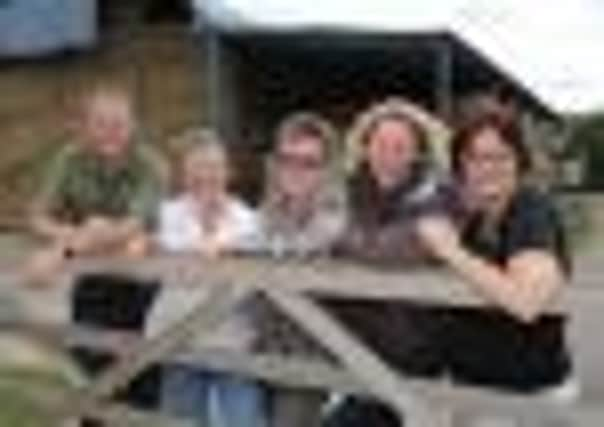Farm of the week: Making the farm a vital social centre


HOODIES, of the teenage urban rather than the feathered sort, are the national topic of the day, so Gareth Gaunt is an appropriate kind of farmer to visit.
He has met a few, in the course of building a ‘care farm’ business which seems to be evolving into a centre for all sorts of therapies for all kinds of people.
Advertisement
Hide AdAdvertisement
Hide AdAged 42, he runs Carlshead Farm at Sicklinghall, near Wetherby, with his father, Robin.
They have 500 acres but it is not especially good land, although the setting is lovely.
“When the diversification message started, there was a lot of talk about the triangle of economic and environmental and social needs for the rural sector,” says Gareth. “The first two were simple enough to understand but it was not very clear what a farm was meant to do in terms of social engagement. Except to me it was. A farm always used to be both a work and social centre, which would find a place for everybody. Now they are virtually people-free areas and I find that a shame.”
He went to see young unemployed people at work in a Lincolnshire woodland scheme. He looked at what happens in Holland, where 800 care farms work directly for the government, and he got involved with the development of the National Care Farming Initiative – now Care Farming UK.
Advertisement
Hide AdAdvertisement
Hide AdThe agricultural side of the farm lives on but a lot of it has been sub-contracted. Graham Hunt uses the pastures to run his Dexter cattle, sheep and free-range pigs, as featured in these pages. A hundred arable acres are share-farmed with neighbour Johnny Park. A biomass growing co-op, Regro, does most of the work on harvesting of 150 acres of willow for Drax. The whole farm is in Higher Level Stewardship, which brings in some income for leaving well alone.
Gareth chips into all this but for the past six years, most of his time has been spent on the Carlshead Business Centre and the Carlshead Care Farm, which he set up with a million-pound investment in building. That is now coming back at around £60-£70,000 a year for the offices and about the same from education and social services contracts. “We were netting perhaps £15,000 from the farm alone,” he reckons.
Selling the care farm idea was a struggle at first and still is at times. But gradually a new kind of business has taken shape. And countrywide, there are now a couple of hundred like it.
On the afternoon we visit, the customers are a party from Wetherby’s adult day-care community. They sit out in the sunshine to plant seeds for the vegetable beds and then want to go and see all the animals before tea. Last week, they went into the woods and built fires and toasted marshmallows with one of Gareth’s assistants, Phil Pemberton, a survival skills instructor whose history includes three years working for Ray Mears. Next week, a music therapist is coming in.
Advertisement
Hide AdAdvertisement
Hide AdAnother full-time employee, Drew Wood, manages the centre and teaches cooking, art and bicycle maintenance.
Between them, they organise lessons – and basic qualifications, through the National Open College Network – in those subjects and bushcraft, map reading, woodwork, farm animal care, horse care, gardening and photography.
“I would love a certificate in basic tractor mechanics,” says Gareth, “but there is nothing like that so far.”
He keeps horses and his parents have alpacas. There is a riding stables next door and the farm has fishing ponds, maintained by West Riding Anglers in exchange for rights on the river, but reserved for the care farm clients.
Advertisement
Hide AdAdvertisement
Hide AdAbout 40-50 teenagers from Leeds will come through over a year, on various programmes. Most are already more or less finished with schooling and Gareth thinks Leeds could do with letting them get away from the classroom younger a bit more often. In September, the farm will start taking in autistic children. And Gareth is looking for more business from the national health service. GPs should consider prescribing a course in the country for all sorts of problems, from depression to obesity, he suggests.
In pursuit of all the possibilities, he has assembled around him a rare brew of offbeat talents.
Trish Nugent has a string of alternative therapy qualifications and runs Holistic Well-being, offering everything from massage to meditation lessons.
Sarah Kreutzer taught herself psychology through working with awkward horses and now runs Learning To Listen, offering leadership training and therapy for humans through work with horses.
Advertisement
Hide AdAdvertisement
Hide AdEileen Hinds used to run four Pupil Referral Units and now runs the 18consultancy, coaching the professionals who still do the job and other customers.
Sue Derdrowski did not enjoy school much herself and turned herself into an expert in working with difficult kids. She has worked in most of the secondary schools in Middlesbrough and is now finding similar work in West Yorkshire through her consultancy Time2Begin.
Somehow they have all ended up basing their businesses at Carlshead. More than one mentions feeling some sort of mystical call to the place. Now they are working with each other, and Gareth, on various fusion projects. Sarah’s horses will come into the programme for the autistics, for example.
Back on the subject of aimless youths, Gareth says the best he can usually do is give them a sniff of the rural way of life and hope they like it. They are not usually much help as labour. But given enough time, they might be, and he dreams of schemes in which they would produce free-range chickens or veg boxes under the Carlshead Care Farm label.
Watch his space at www.carlshead.co.uk/